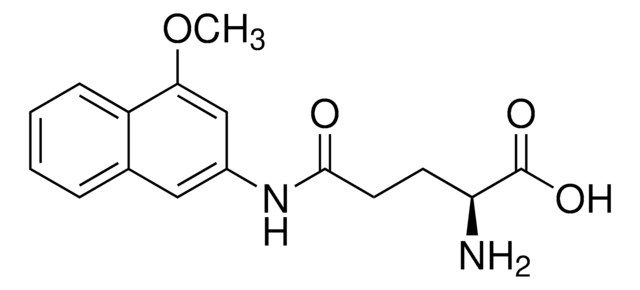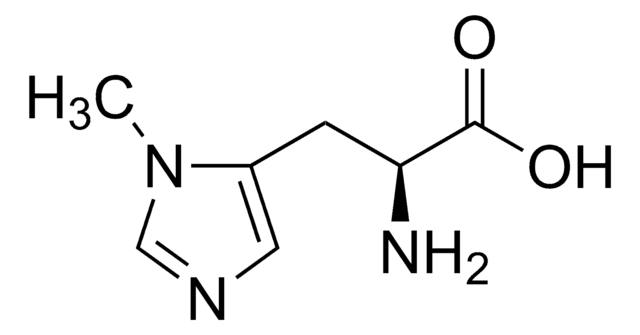H6647
L-Histidinol dihydrochloride
≥98% (TLC)
Synonyme(s) :
β-Aminoimidazole-4-propanol dihydrochloride, (S)-2-Amino-3-(4-imidazolyl)propanol dihydrochloride
About This Item
Produits recommandés
product name
L-Histidinol dihydrochloride, ≥98 (TLC)
Pureté
≥98% (TLC)
Forme
powder
Couleur
white to off-white
Pf
198-201 °C (dec.) (lit.)
Application(s)
cell analysis
Chaîne SMILES
Cl[H].Cl[H].N[C@H](CO)Cc1c[nH]cn1
InChI
1S/C6H11N3O.2ClH/c7-5(3-10)1-6-2-8-4-9-6;;/h2,4-5,10H,1,3,7H2,(H,8,9);2*1H/t5-;;/m0../s1
Clé InChI
FRCAFNBBXRWXQA-XRIGFGBMSA-N
Informations sur le gène
human ... HRH1(3269)
mouse ... HRH1(15465)
rat ... HRH1(24448)
Vous recherchez des produits similaires ? Visite Guide de comparaison des produits
Application
- as a reagent in urinary metabolite analysis
- for making DT40 knockout cells, where cells were selected in 1mg/ml histidinol
- for inducing amino acid deprivation in HepG2 cells
Actions biochimiques/physiologiques
Mention d'avertissement
Warning
Mentions de danger
Conseils de prudence
Classification des risques
Eye Irrit. 2 - Skin Irrit. 2 - STOT SE 3
Organes cibles
Respiratory system
Code de la classe de stockage
11 - Combustible Solids
Classe de danger pour l'eau (WGK)
WGK 3
Point d'éclair (°F)
Not applicable
Point d'éclair (°C)
Not applicable
Équipement de protection individuelle
dust mask type N95 (US), Eyeshields, Gloves
Certificats d'analyse (COA)
Recherchez un Certificats d'analyse (COA) en saisissant le numéro de lot du produit. Les numéros de lot figurent sur l'étiquette du produit après les mots "Lot" ou "Batch".
Déjà en possession de ce produit ?
Retrouvez la documentation relative aux produits que vous avez récemment achetés dans la Bibliothèque de documents.
Notre équipe de scientifiques dispose d'une expérience dans tous les secteurs de la recherche, notamment en sciences de la vie, science des matériaux, synthèse chimique, chromatographie, analyse et dans de nombreux autres domaines..
Contacter notre Service technique









